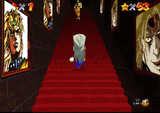Search Results
8/11/2025, 1:30:21 AM
Since this thread is a repost-
Dio's 'complexity' is consistent throughout all of Part 1. He innately views himself as superior to everyone else, with a begrudging respect for Johnathan at the start (and at the end, that transforms into truly viewing him as an equal, and thus worthy of becoming his new body).
Dio is more 'complex' in Parts 3 and 6 by all accounts, where his actions are often imbued with more meaning and significance than is ever actually shared with the audience. The Hol Horse scene in particular is a standout one as it implies so much about his character without stopping to explain how Dio has changed.
But really, the 'complexity' of a villain is not significant and JoJo benefits from villains that tend to not linger on the details. The villains are representations of ideas, antithesis to the given protagonist.
Dio in Part 1 is selfish where Johnathan is selfless. A scoundrel against a gentleman. It's incredibly basic, but the narrative is, for all of JoJo, to be a celebration of humanity. Dio's literal rejection of humanity plays into that, that he would abandon it for his own pursuits, that he would lie and undercut people, even kill, just to advance himself. He does not care for humanity, whereas Johnathan pulls people from the slums and into his light.
Kars is an expansion on that. Kars is literally inhuman, but what sticks out in his final transformation is the lack of a need for sex- that is explicitly mention. How is Joseph written? As the most sexual JoJo in the franchise, and Part 4 reveals he literally could not contain his seed to one woman. He is humanity.
And so on and so on.
On complexity as well, consider these characters deeply. A good starter question is always 'Why did Dio do X' for anything in Part 3, or even 'Why is Kira in DMQ?', and let your mind wander, learn to wonder for a moment.
This will sound absurd, but JoJo is genuinely the manga equivalent to the bible. Not in the religious sense... someone will get it.
Dio's 'complexity' is consistent throughout all of Part 1. He innately views himself as superior to everyone else, with a begrudging respect for Johnathan at the start (and at the end, that transforms into truly viewing him as an equal, and thus worthy of becoming his new body).
Dio is more 'complex' in Parts 3 and 6 by all accounts, where his actions are often imbued with more meaning and significance than is ever actually shared with the audience. The Hol Horse scene in particular is a standout one as it implies so much about his character without stopping to explain how Dio has changed.
But really, the 'complexity' of a villain is not significant and JoJo benefits from villains that tend to not linger on the details. The villains are representations of ideas, antithesis to the given protagonist.
Dio in Part 1 is selfish where Johnathan is selfless. A scoundrel against a gentleman. It's incredibly basic, but the narrative is, for all of JoJo, to be a celebration of humanity. Dio's literal rejection of humanity plays into that, that he would abandon it for his own pursuits, that he would lie and undercut people, even kill, just to advance himself. He does not care for humanity, whereas Johnathan pulls people from the slums and into his light.
Kars is an expansion on that. Kars is literally inhuman, but what sticks out in his final transformation is the lack of a need for sex- that is explicitly mention. How is Joseph written? As the most sexual JoJo in the franchise, and Part 4 reveals he literally could not contain his seed to one woman. He is humanity.
And so on and so on.
On complexity as well, consider these characters deeply. A good starter question is always 'Why did Dio do X' for anything in Part 3, or even 'Why is Kira in DMQ?', and let your mind wander, learn to wonder for a moment.
This will sound absurd, but JoJo is genuinely the manga equivalent to the bible. Not in the religious sense... someone will get it.
Page 1
